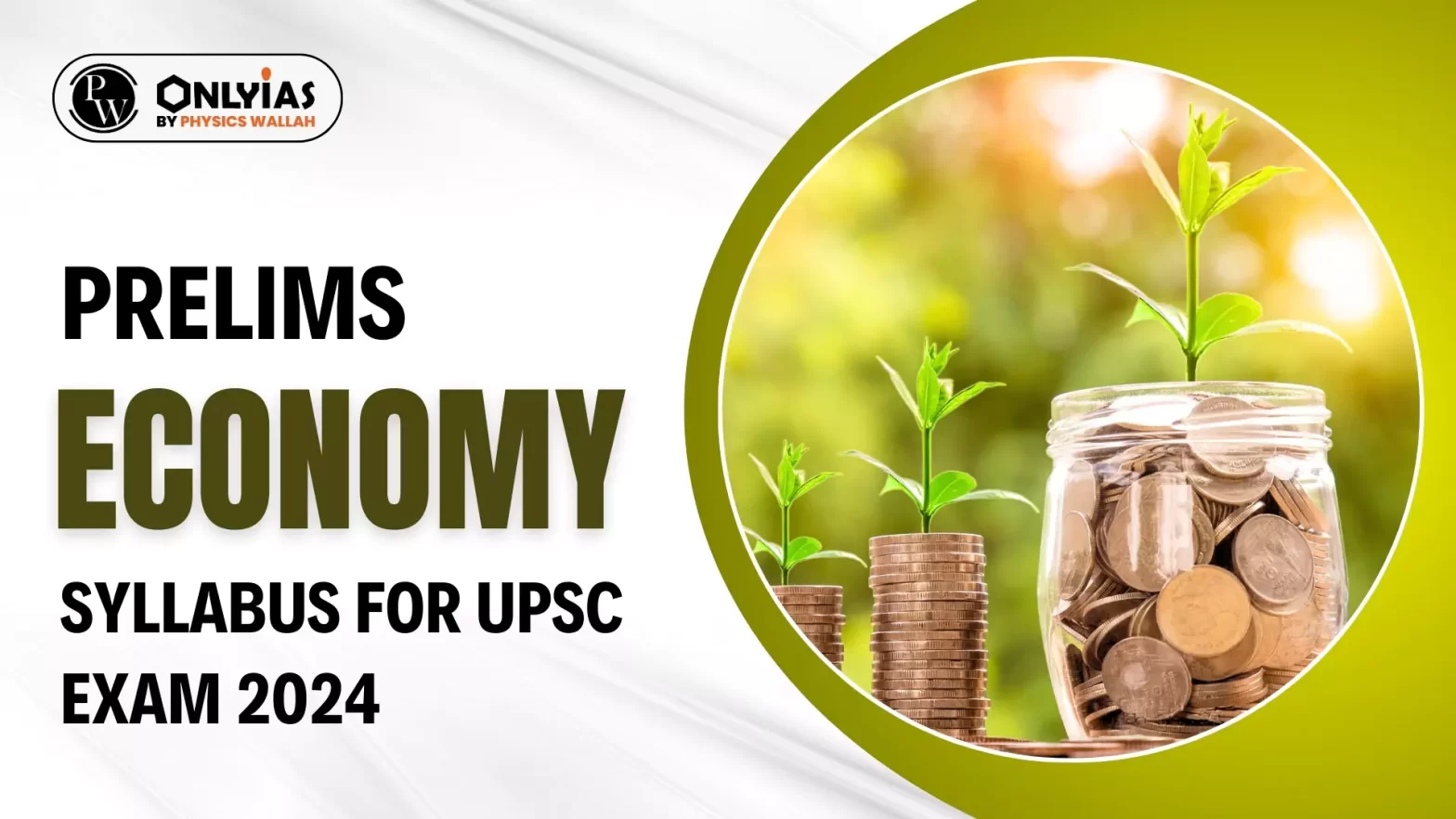Master the UPSC Prelims Economy Syllabus with comprehensive details, booklist, strategy, and FAQs. Score high by understanding the economy inside out.

Understanding the Prelims Economy Syllabus for UPSC is important to score good marks in the Prelims exam. A comprehensive detail of the Prelims Economy syllabus is provided here. Let’s read the article for more details!
The Union Public Service Commission Preliminary Examination, or UPSC Prelims, is the first stage of the Civil Services Examination conducted by the UPSC. The Prelims consist of two papers: General Studies Paper-I and General Studies Paper-II (CSAT), both of which are objective-type multiple-choice exams.
The detailed UPSC Prelims Syllabus can be found in the table below:
| General Studies Paper I | General Studies Paper II (CSAT) |
|
|
| Type | General Studies Paper 1 | GS Paper II- (CSAT) |
| Questions | 100 Objective Type | 80 Objective Type |
| Marks | 200 Marks | 200 Marks |
| Negative Marking | +2 Marks/Question and -0.66 Negative Marks/Question | +2.5 Marks/Question /Question and -0.83 Negative Marks/Question |
| Duration of Exam | 2 Hours | 2 Hours |
| Qualifying Marks | Cut-off List | Minimum 33% |
| Languages | English and Hindi | English and Hindi. |
Important Note: It is mandatory for the candidate to appear in both papers for the purpose of evaluation. The candidate will be disqualified if he/she does not appear in both papers of the preliminary examination.
The UPSC Prelims Economy syllabus expects a candidate to know basics about the Indian and world economy, development, planning, trade trends, reforms and many more. Candidates must also study trade institutions across the country. The complete detail of UPSC prelims Economy syllabus are as follows:
| Topics | Subtopics |
| Basic Concepts |
|
| Economic Measurement |
|
| Human Development |
|
| Planning In India |
|
| Monetary And Credit Policy |
|
| Fiscal System |
|
| Inflation |
|
| Money Market And Capital Market |
|
| Taxation |
|
| Stock Market |
|
| Banking In India |
|
| Public Debt |
|
| Balance of Payment |
|
| Poverty |
|
| Inequality |
|
| Infrastructure |
|
| WTO And GATT |
|
| IMF |
|
| World Bank Group |
|
| Public Sector In India |
|
| LPG Reforms |
|
| Agriculture |
|
Candidates preparing for prelims have to choose books that completely cover the UPSC prelims Economy syllabus. The complete booklist for the economy syllabus is given below:
| Book Type | Book Name |
| NCERT |
|
| Reference Books |
|
| Other Sources (Current Affairs) |
|
On analysis of past question papers, it is clear that UPSC Prelims Economy syllabus has a good amount of weightage. The questions are both factual as well as conceptual. The detailed weightage of economy questions is given below:
| Year of Preliminary Examination | Number of Economy Questions |
| 2023 | 14 |
| 2022 | 18 |
| 2021 | 10 |
| 2020 | 15 |
| 2019 | 14 |
| 2018 | 18 |
| 2017 | 16 |
| 2016 | 24 |
| 2015 | 21 |
| 2014 | 10 |
The UPSC Prelims Economy Syllabus can be covered easily if a candidate has a plan in place. With a structured plan and guidance from a mentor, candidates can grasp both basic and advanced concepts of the UPSC Prelims Economy syllabus effectively. Solve effectively previous year questions (PYQs) and economics test series. This understanding enables them to apply their knowledge during the examination and
| Must Read | |
| NCERT Notes For UPSC | UPSC Daily Current Affairs |
| UPSC Blogs | UPSC Daily Editorials |
| Daily Current Affairs Quiz | Daily Main Answer Writing |
| UPSC Mains Previous Year Papers | UPSC Test Series 2024 |
NCERT explains the topics in a simple and lucid way, making it appropriate for beginners. It forms the foundation for future learning.
On an average, the economy subject carries a weightage of 12-15% for UPSC prelims. This translates to about 15 questions on an average.
A candidate from a science background must familiarise himself with the basic economic terms and concepts. For that, he/she has to read NCERT books.
Yes. Apart from the static syllabus, questions can be asked about current affairs topics related to the economy.
It is advisable to revise the economy syllabus as many times as possible before the exams. A minimum of three revisions have to be done.
Yes. The budget and economic survey form the dynamic part of the UPSC economy for prelims, and questions are asked from these documents.
<div class="new-fform">
</div>